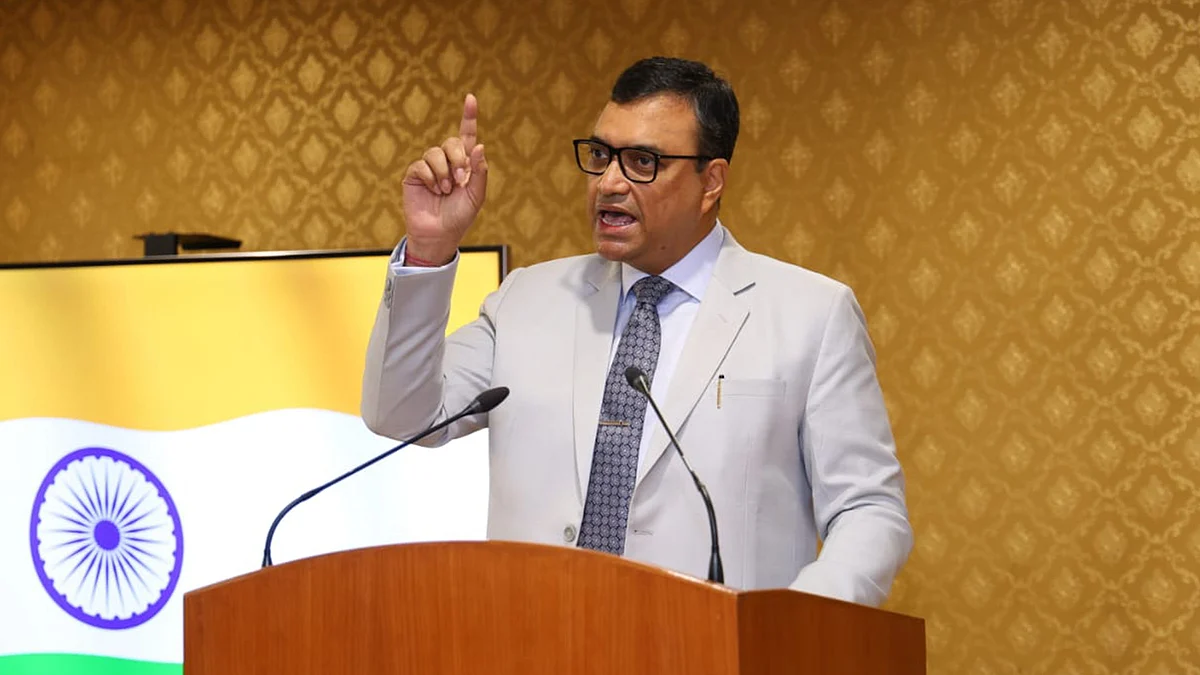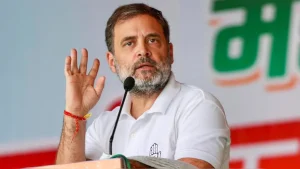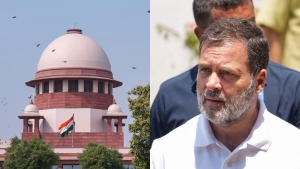New Delhi – The Supreme Court of India has delivered a stern rebuke to Congress leader Rahul Gandhi over his controversial statements about the Indian military, questioning whether “a true Indian will not say all this.” The Rahul Gandhi Remarks On Indian Army controversy has escalated to the highest judicial forum, where justices expressed serious concern about the appropriateness of such statements from a senior political leader.
Supreme Court Questions Platform and Content

The apex court’s criticism of Rahul Gandhi Remarks On Indian Army centered on both the content and the platform chosen for making such sensitive statements. Justices Dipankar Datta and Augustine George Masih questioned Gandhi’s choice of words and his decision to make these comments through media channels rather than appropriate parliamentary forums.
“Why do you have to say this in media or social media posts? Were you there? How did you get to know that 2,000 square kilometres has been captured?” the bench asked Gandhi’s legal counsel. This judicial scrutiny of Rahul Gandhi Remarks On Indian Army highlights the court’s concern about unsubstantiated claims regarding national security matters.
Controversial Bharat Jodo Yatra Statements


The Rahul Gandhi Remarks On Indian Army controversy stems from statements made during the Bharat Jodo Yatra in December 2022. During a press interaction on December 9, 2022, Gandhi alleged that the Chinese Army had “captured 2,000 sq km of Indian territory,” “killed 20 Indian soldiers,” and “thrashed our jawans in Arunachal Pradesh.”
These Rahul Gandhi Remarks On Indian Army specifically referenced the border clash in Arunachal Pradesh’s Yangtse sector, making claims that would later form the basis of criminal defamation proceedings against the Congress leader. The timing and content of these statements have become central to the legal challenge he now faces.
Judicial Disapproval of Opposition Leader’s Conduct
The Supreme Court expressed particular concern about Rahul Gandhi Remarks On Indian Army coming from someone holding the position of Leader of the Opposition. The bench questioned whether such statements were appropriate during times of cross-border conflict, emphasizing the responsibility that comes with high political office.
“You go on saying Article 19(1)(a), but as leader of the Opposition, should you really be making such statements at a time of cross-border conflict?” the court asked. This judicial commentary on Rahul Gandhi Remarks On Indian Army underscores the court’s view that political leaders must exercise greater restraint when discussing sensitive military matters.
Parliament as Appropriate Forum for Concerns
The Supreme Court emphasized that Rahul Gandhi Remarks On Indian Army should have been made in Parliament rather than through public forums or media briefings. The justices stressed that such sensitive statements, if necessary at all, belong in the legislative chamber where they can be properly debated and scrutinized.
“Whatever you have to say, why don’t you say in the Parliament? Why do you have to say this in social media posts?” the court questioned. This guidance regarding Rahul Gandhi Remarks On Indian Army suggests that the judiciary expects political leaders to use institutional channels for raising national security concerns.
Also Read: PDA Pathshala UP Controversy: Explosive Political Education Row Sparks Debate
Legal Defense and Constitutional Rights


Senior counsel Abhishek Manu Singhvi defended Rahul Gandhi Remarks On Indian Army by invoking Article 19(1)(a) of the Constitution, which guarantees freedom of speech and expression. He argued that Gandhi’s status as a Member of Parliament does not diminish his fundamental rights to express opinions on matters of public interest.
Singhvi contended that Rahul Gandhi Remarks On Indian Army were intended to prompt media attention to uncomfortable but necessary questions about national security. The defense strategy attempts to frame these controversial statements as legitimate political discourse rather than defamatory content.
Complainant’s Serious Allegations
The defamation case against Rahul Gandhi Remarks On Indian Army was filed by Uday Shankar Srivastava, a retired director of the Border Roads Organisation (BRO). Srivastava accused Gandhi of defaming the Indian Army and attempting to demoralize soldiers through “false and baseless” claims.
According to the complaint, Rahul Gandhi Remarks On Indian Army were made “knowingly and mischievously” with intent to demoralize the army and mislead the public. The complainant emphasized that the army had issued official statements clarifying that Chinese troops were successfully repelled during the Yangtse faceoff.
Army’s Official Position Contradicts Claims
The controversy surrounding Rahul Gandhi Remarks On Indian Army is compounded by the fact that official army statements contradicted his claims. Military authorities had clarified that Chinese troops were successfully repelled during the border incident, making Gandhi’s characterization appear factually incorrect.
This discrepancy between Rahul Gandhi Remarks On Indian Army and official military accounts strengthens the complainant’s argument that the statements were not only inappropriate but also potentially damaging to national integrity and military morale.
Allahabad High Court’s Earlier Refusal
Before reaching the Supreme Court, Rahul Gandhi Remarks On Indian Army faced judicial scrutiny at the Allahabad High Court, which refused to quash the trial court’s summons on May 29. The High Court noted that a prima facie case had been established against Gandhi.
The High Court also dismissed Gandhi’s argument that Rahul Gandhi Remarks On Indian Army were made in the course of official duties, ruling that prior sanction under Section 197 of the CrPC was not required for the defamation proceedings.
Supreme Court Stays Proceedings

Despite its criticism, the Supreme Court has stayed further trial court proceedings regarding Rahul Gandhi Remarks On Indian Army while agreeing to examine key legal issues. The court will consider whether the trial court’s summons was issued without proper hearing and whether the complainant qualifies as an “aggrieved” person under defamation law.
The stay on Rahul Gandhi Remarks On Indian Army proceedings provides temporary relief while allowing comprehensive examination of the legal and constitutional issues involved in this high-profile case that continues to generate significant political and judicial attention.

